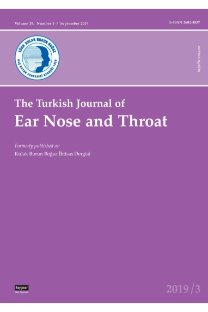İki yıllık takipte kliniğinde ve boyutunda değişiklik saptanmayan dev retrofarengeal lipom: Olgu sunumu
Lipom/komplikasyon/radyografi, farenks neoplazileri/radyografi, bilgisayarlı tomografi.
A giant retropharyngeal lipoma showing no change in clinical presentation and size within a two-year follow-up: a case report
Lipoma/complications/radiography pharyngeal neoplasms/radiography, tomography, X-ray computed,
___
- Eisele DW, Landis GH. Retropharyngeal infiltrating lipoma-a case report. Head Neck Surg 1988;10:416-21.
- Davis WL, Harnsberger HR, Smoker WR, Watanabe AS. Retropharyngeal space: evaluation of normal anatomy and diseases with CT and MR imaging. Radiology 1990;174:59-64.
- Seid AB, Dunbar JS, Cotton RT. Retropharyngeal abscesses in children revisited. Laryngoscope 1979;89: 1717-24.
- Wong YK, Novotny GM. Retropharyngeal space - a review of anatomy, pathology, and clinical presenta- tion. J Otolaryngol 1978;7:528-36.
- Ulku CH, Uyar Y, Unaldi D. Management of lipomas arising from deep lobe of the parotid gland. Auris Nasus Larynx 2005;32:49-53.
- Namyslowski G, Scierski W, Misiolek M, Urbaniec N, Lange D. Huge retropharyngeal lipoma causing obstructive sleep apnea: A case report. Eur Arch Otorhinolaryngol 2006;263:738-40.
- Akhtar J, Shaykhon M, Crocker J, D’Souza AR. Retropharyngeal lipoma causing dysphagia. Eur Arch Otorhinolaryngol 2001;258:458-9.
- Abdullah BJ, Liam CK, Kaur H, Mathew KM. Parapharyngeal space lipoma causing sleep apnoea. Br J Radiol 1997;70:1063-5.
- Kim JY, Park JM, Lim GY, Chun KA, Park YH, Yoo JY. Atypical benign lipomatous tumors in the soft tissue: radiographic and pathologic correlation. J Comput Assist Tomogr 2002;26:1063-8.
- Murphey MD, Carroll JF, Flemming DJ, Pope TL, Gannon FH, Kransdorf MJ. From the archives of the AFIP: benign musculoskeletal lipomatous lesions. Radiographics 2004;24:1433-66.
- Hockstein NG, Anderson TA, Moonis G, Gustafson KS, Mirza N. Retropharyngeal lipoma causing obstructive sleep apnea: case report including five-year follow-up. Laryngoscope 2002;112:1603-5.
- ISSN: 2602-4837
- Yayın Aralığı: Yılda 4 Sayı
- Başlangıç: 1991
- Yayıncı: İstanbul Üniversitesi
Tiroid papiller karsinomunun kapsüllü folliküler varyantında cerrahi yaklaşım: Üç olgu sunumu
Ahmet EYİBİLEN, İbrahim ALADAĞ, Mehmet GÜVEN, Reşit Doğan KÖSEOĞLU
Hatice LAKADAMYALI, Tarkan ERGÜN, Hüseyin LAKADAMYALI, Suat AVCI
Fonksiyonel ve selektif boyun diseksiyonu sonrası internal juguler ven trombozu
Necmi ARSLAN, Engin DURSUN, Berna OĞUZ, Haldun OĞUZ, M. Asım ŞAFAK, Münir DEMİRCİ, Onur ÇETİN
Samet Vasfi KUVAT, Günter HAFIZ, Fatih KABAKAŞ, Atakan AYDIN, Ayhan OKUMUŞ
Puberfoni hastalarında tedavi şeması
Total larenjektomi sonrası farengokutanöz fistül: Sıklığı, etkileyen faktörler ve tedavi yaklaşımı
Davut AKDUMAN, Barış NAİBOĞLU, Celil USLU, Çağatay OYSU, Arman TEK, Mehmet SÜRMELİ, Yasin KILIÇARSLAN, Muhammed YANILMAZ
İmdat YÜCE, Sedat ÇAĞLI, Ali BAYRAM, Ercihan GÜNEY
Tekrarlayan reaktif lenfadenopatili bir olguda Castleman hastalığı
Özgül TOPAL, Necat ALATAŞ, Hatice Seyra ERBEK, Selim ERBEK, Emine TOSUN
